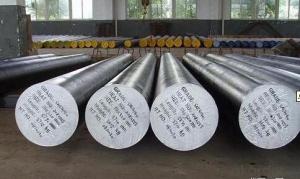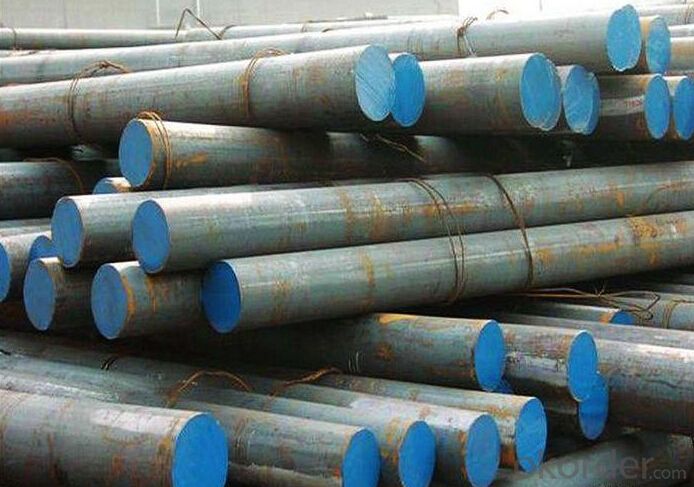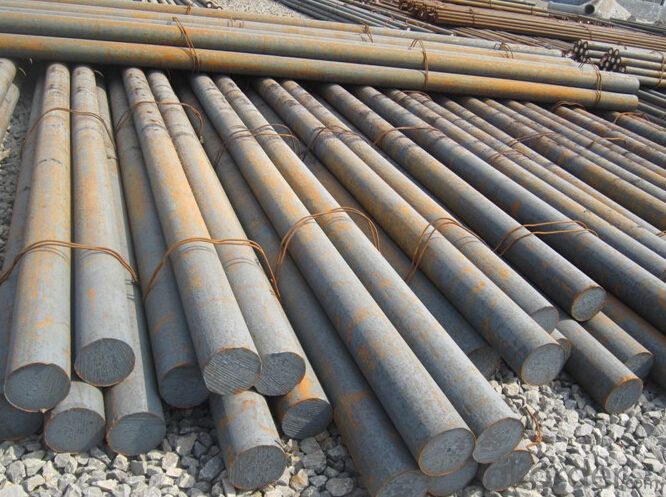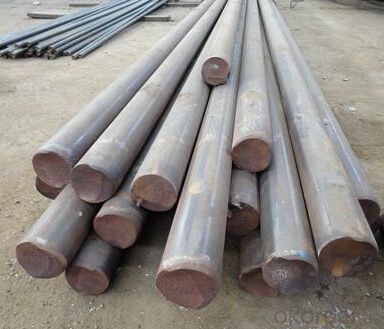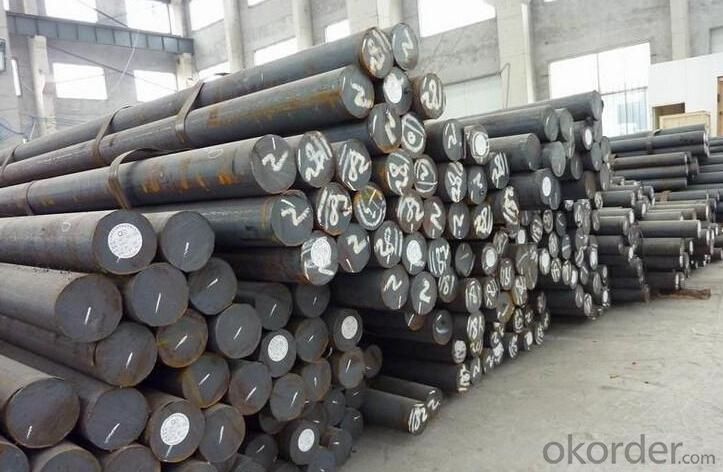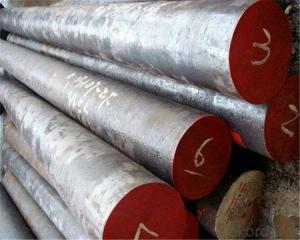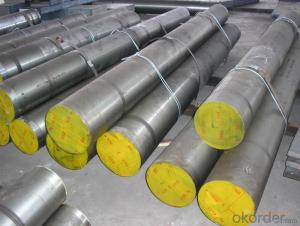DIN1.7225/SAE4140 CNBM Alloy Steel Round Bar with High Quality
- Loading Port:
- Tianjin
- Payment Terms:
- TT OR LC
- Min Order Qty:
- 3 m.t.
- Supply Capability:
- 10000 m.t./month
OKorder Service Pledge
OKorder Financial Service
You Might Also Like
Specification
DIN1.7225/SAE4140 Alloy Steel Round Bar Price
Name | DIN1.7225/SAE4140 Steel Round Bar |
Shape | Round Bar/Square Bar/Flat Bar/Plate/Wire |
Standard | GB/ASTM/SAE/AISI/DIN/JIS/EN/BS |
Surface Treatment: | Black/Peeling/Polished/Machined |
Delivery Condition: | Hot Rolled or Forged/Peeled or Black Surface |
Test | SGS/UT 100% Elements Testing |
Certificate: | ISO/Mill Certificate |
Service: | 24 hours online service / |
more than 20 years trading and manufacture | |
Quality Assurance: | the third party inspection, such as SGS, BV, TUV…etc. is acceptable |
Packaging Details: | seaworthy packaging or as per customer's packing instruction |
Chemical Composition
C | Si | Mn | Cr | Mo | P | S |
0.38-0.43 | 0.40max | 0.60-0.90 | 0.90-1.20 | 0.15-0.30 | ≤0.035 | ≤0.035 |
Application
4140 Alloy Steel is engineering steel supplied in quenched and tempered conditions.
Very good machinability.
High toughness.
High creep strength.
Repeated impact resistant capability.
Packaging & Delivery
Packaging Detail | Sea worthy packing /as per customer's packing instruction |
Delivery Detail | 15 ~ 40 days after receiving the deposit |
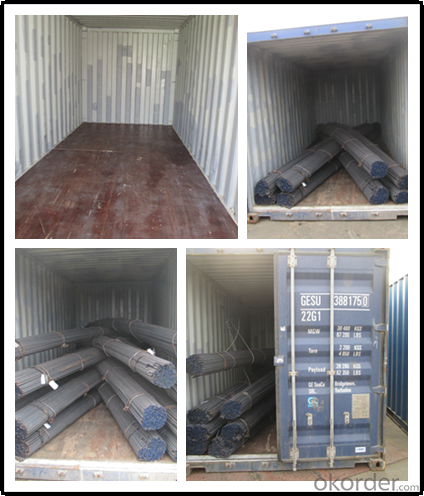
Product Show
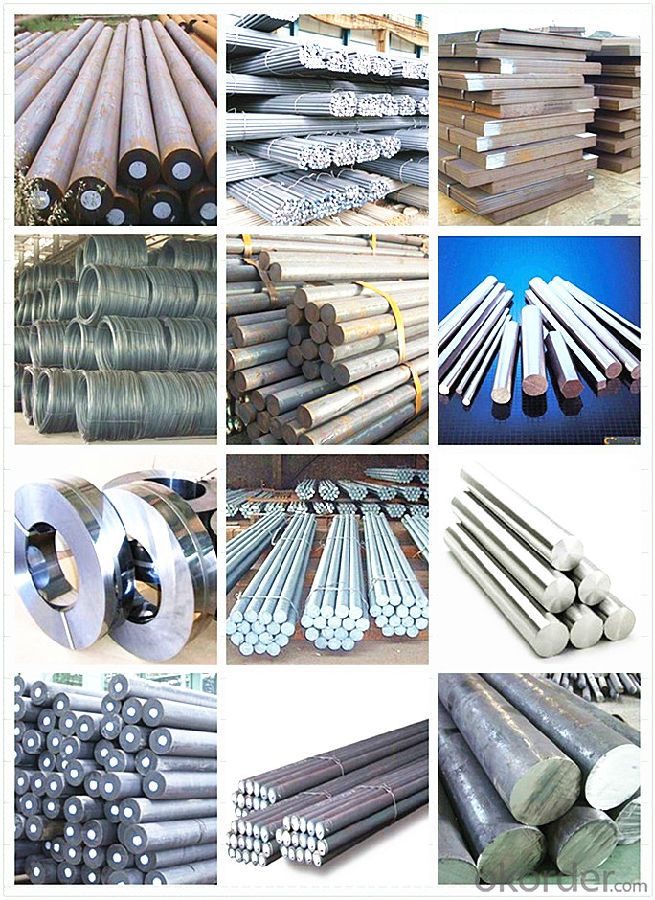
Workshop
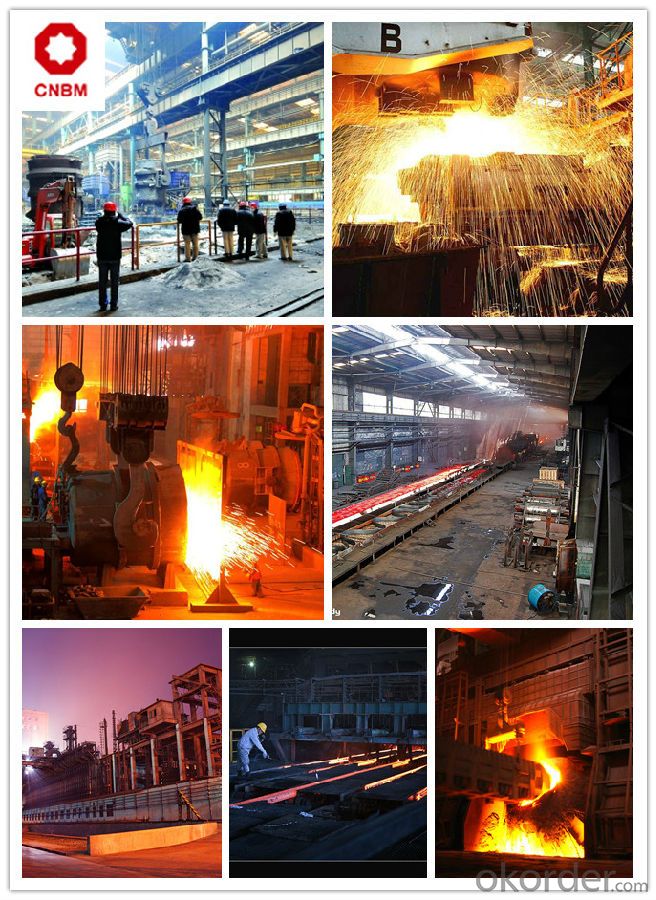
FAQ
Are you a trading company or manufacturer? | Manufacturer |
What’s the MOQ? | 3 metric ton |
What’s your delivery time? | 15-35 days after downpayment received |
Do you Accept OEM service? | Yes |
what’s your delivery terms? | FOB/CFR/CIF |
What's the Payment Terms? | 30% as deposit,70% before shipment by T/T |
Western Union acceptable for small amount. | |
L/C acceptable for large amount. | |
Scrow ,Paybal,Alipay are also ok | |
Why choose us? | Chose happens because of quality, then price, We can give you both. |
Additionally, we can also offer professional products inquiry, products knowledge train (for agents), smooth goods delivery, excellent customer solution proposals. | |
What's your available port of Shipment? | Main Port, China |
What’s your featured services? | Our service formula: good quality+ good price+ good service=customer's trust |
Where are your Market? | Covering more than 160 countries in the world |
- Q: What are the different material selection factors for special steel?
- The selection of materials for special steel involves considering various factors to ensure the desired performance, durability, and cost-effectiveness of the final product. Some of the key material selection factors for special steel include: 1. Mechanical Properties: Special steel should possess the required mechanical properties to meet the specific application's demands. This includes factors like strength, hardness, toughness, fatigue resistance, and wear resistance. 2. Corrosion Resistance: Depending on the intended use, special steel may need to possess high corrosion resistance to withstand exposure to harsh environments, chemicals, or moisture. This factor ensures the longevity and reliability of the steel in its intended application. 3. Heat Resistance: Special steel may need to exhibit excellent heat resistance properties, particularly for applications involving high temperatures, such as in aerospace or power generation industries. The material should be able to retain its strength and structural integrity even at elevated temperatures. 4. Machinability: The ease with which special steel can be machined is an essential factor to consider, especially for applications involving complex shapes or precision components. High machinability allows for efficient manufacturing processes and reduces production costs. 5. Weldability: Special steel selected for applications that require joining through welding should possess good weldability. This ensures that the material can be easily welded without compromising its strength or introducing defects. 6. Cost: The cost of the material plays a significant role in material selection. Balancing the desired properties with the available budget is crucial to achieve the optimal cost-effectiveness of the final product. 7. Availability: The availability of the chosen special steel is also a vital consideration. Ensuring a reliable and consistent supply of the material is necessary to avoid production delays or interruptions. 8. Environmental Impact: The environmental impact of the material should be evaluated, considering factors such as energy consumption during production, recyclability, and the use of sustainable raw materials. Opting for eco-friendly materials aligns with sustainable practices and regulations. By carefully considering these material selection factors, engineers and designers can choose the most suitable special steel for their specific application, ensuring optimal performance, durability, and cost-efficiency.
- Q: What are the main characteristics of heat-resistant steel?
- The main characteristics of heat-resistant steel include high resistance to oxidation, excellent strength at elevated temperatures, good thermal stability, and the ability to maintain its structural integrity even under extreme heat conditions.
- Q: What are the different methods for controlling the grain size in special steel?
- Special steel can be controlled for grain size using various methods. One method is heat treatment, where the steel is subjected to specific temperatures and cooling rates. By controlling the rate of nucleation and growth of new grains, the grain size can be refined. For example, slow cooling encourages the formation of larger grains, while rapid cooling results in smaller grain sizes. Alloying elements can also influence grain size. Elements like vanadium, niobium, and titanium can form carbides, acting as nucleation sites and leading to finer grain sizes. Conversely, elements like aluminum and silicon promote the formation of larger grains. Mechanical deformation, such as rolling or forging, can also affect grain size. These processes break up larger grains into smaller ones, thereby refining the grain size. Techniques like equal-channel angular pressing can even produce ultrafine grains in special steel. Certain elements, like boron and zirconium, can act as grain growth inhibitors during heat treatment. By controlling the concentration of these inhibitors, grain growth can be prevented, maintaining a desired grain size. Controlling the cooling rate during solidification and heat treatment is another method for controlling grain size. By carefully managing the cooling rate, a specific grain size or desired distribution of grain sizes can be achieved. It is important to consider the specific application and desired properties of the steel when choosing a method for controlling grain size. Different methods may be combined to achieve the desired grain size and optimize the performance of the steel for its intended use.
- Q: How does special steel withstand extreme temperatures?
- Special steel is designed to withstand extreme temperatures due to its unique composition and manufacturing process. It contains a higher percentage of alloying elements, such as chromium, nickel, and molybdenum, which enhance its heat resistance properties. These alloys form a protective layer on the surface of the steel, preventing oxidation and corrosion at high temperatures. Additionally, special steel undergoes specific heat treatment methods, such as quenching and tempering, which further enhance its ability to withstand extreme temperatures without losing its strength and structural integrity.
- Q: What are the main applications of special steel in the mining processing?
- Special steel has several important applications in the mining processing industry. It is commonly used for manufacturing durable and corrosion-resistant equipment such as conveyor belts, crushers, and drill bits. Special steel's high tensile strength and hardness make it ideal for constructing heavy machinery that can withstand the harsh conditions of mining operations. Additionally, its resistance to heat and abrasion makes it suitable for lining chutes and hoppers, as well as for fabricating screens and sieves. Overall, special steel plays a critical role in enhancing the efficiency, reliability, and safety of mining processes.
- Q: What are the specific requirements for special steel used in the marine industry?
- The specific requirements for special steel used in the marine industry include high corrosion resistance, ability to withstand extreme temperatures and pressure, superior strength and toughness, good weldability, and resistance to fatigue and cracking. Additionally, the steel should be able to withstand exposure to seawater and other harsh environmental conditions without deteriorating or causing any negative impact on the marine ecosystem.
- Q: What are the requirements for special steel used in mining equipment?
- The mining industry imposes strict standards on the special steel required for mining equipment due to its challenging nature. Here are some of the essential criteria: 1. Strength and toughness: The mining equipment operates in harsh conditions, enduring heavy loads, impacts, and abrasion. The special steel must possess high strength to withstand these forces and maintain its structural integrity. Additionally, it should exhibit exceptional toughness to prevent fractures and withstand sudden shocks. 2. Resistance to corrosion: Mining operations often occur in corrosive environments, such as underground mines or near water bodies. The special steel utilized in mining equipment should display remarkable resistance to corrosion and oxidation to ensure its durability and prevent premature failure. 3. Resistance to wear: Mining equipment is exposed to abrasive substances, like rocks and minerals, which can cause significant wear. The special steel employed in mining equipment should possess excellent wear resistance properties to endure continuous abrasion and prevent premature deterioration. 4. Heat resistance: The mining equipment frequently experiences high temperatures due to friction during operation or proximity to heat sources. The special steel used in mining equipment should exhibit good heat resistance to retain its mechanical properties and avoid deformation or structural failure. 5. Fatigue resistance: Mining equipment undergoes repetitive and cyclic loading, which can lead to fatigue failure over time. The special steel utilized in mining equipment should possess high fatigue resistance to prevent cracking or failure under these cyclic loading conditions. 6. Weldability and machinability: The special steel employed in mining equipment should have favorable weldability and machinability to facilitate the fabrication and assembly processes. This ensures that the equipment can be easily manufactured, repaired, or modified as necessary. 7. Compliance with regulations: Mining equipment often needs to meet specific regulatory standards and certifications to ensure safety and environmental compliance. The special steel used in mining equipment should adhere to these regulations, guaranteeing the equipment's safe operation and absence of environmental hazards. In conclusion, the requirements for special steel used in mining equipment encompass high strength and toughness, corrosion resistance, wear resistance, heat resistance, fatigue resistance, weldability and machinability, and compliance with regulatory standards. These requirements ensure that the steel can endure the harsh conditions and demanding operations encountered in the mining industry.
- Q: How does special steel contribute to the construction industry?
- Special steel plays a crucial role in the construction industry by offering enhanced strength, durability, and resistance to corrosion. It allows for the creation of structurally stable buildings and infrastructure, ensuring safety and longevity. Additionally, special steel enables more efficient and cost-effective construction methods, allowing for innovative designs and the use of lighter materials. Its versatility and reliability make it an essential component in constructing high-rise buildings, bridges, pipelines, and other critical infrastructure projects.
- Q: How does special steel contribute to the nuclear industry?
- The nuclear industry heavily relies on special steel for multiple reasons. To begin with, this type of steel is exceptionally resistant to corrosion and can endure extreme temperatures and pressures. As a result, it is an ideal material for constructing nuclear reactors and other components, ensuring the safety and longevity of nuclear power plants. Additionally, special steel is used in manufacturing fuel assemblies and storage containers for nuclear fuel. These containers must effectively contain radioactive materials without any leakage or contamination. Special steel possesses the necessary strength and durability to meet these requirements. Furthermore, special steel is crucial in the fabrication of steam generators, which are essential components in nuclear power plants. Steam generators transfer heat from the reactor to the turbines, generating electricity. Given the high temperature and pressure conditions inside steam generators, it is essential to use a material that can withstand these harsh circumstances. Special steel fulfills this requirement. Moreover, special steel is employed in the production of control rods. These rods play a vital role in regulating the nuclear reaction within the reactor core by being inserted or withdrawn to control the rate of fission and maintain a stable reaction. Special steel's mechanical properties and resistance to radiation damage ensure the reliability and effectiveness of control rods. Additionally, special steel is utilized in constructing shielding materials and containment structures. These structures aim to protect workers, the environment, and the general public from radiation exposure. Due to its excellent radiation shielding properties, special steel is the preferred material for these applications. In conclusion, special steel is essential to the nuclear industry as it provides the necessary strength, durability, and resistance to corrosion, heat, and radiation. It enables the safe and efficient operation of nuclear reactors, facilitates the storage and transportation of nuclear fuel, and safeguards personnel and the environment.
- Q: What properties make special steel unique?
- Special steel, also referred to as alloy steel, possesses distinct characteristics that differentiate it from other forms of steel. Firstly, special steel stands out due to its remarkable strength and hardness. It is specifically designed to resist deformation, making it ideal for applications that demand robust materials. Whether in the construction, automotive, or aerospace sectors, special steel provides the necessary durability and reliability. Another noteworthy attribute of special steel is its exceptional ability to resist corrosion. By incorporating certain alloying elements like chromium, nickel, or molybdenum, this type of steel becomes highly resistant to rust and other forms of corrosion. Consequently, special steel finds extensive use in marine environments, chemical plants, and oil and gas industries where exposure to harsh conditions is prevalent. Moreover, special steel displays excellent heat resistance. It can endure high temperatures without compromising its strength or structure, rendering it suitable for use in extreme heat environments such as power generation or furnace components. This property allows special steel to be employed in critical situations where other materials may fail or deteriorate. Special steel is renowned for its versatility and adaptability as well. Through the incorporation of various alloying elements and heat treatment processes, it can be customized to meet the specific requirements of different industries. This flexibility enables the creation of specialized alloys with unique properties, such as enhanced machinability, wear resistance, or improved magnetic properties, catering to a wide range of applications. In conclusion, the exceptional strength and hardness, superior corrosion resistance, excellent heat resistance, and adaptability of special steel make it an invaluable material in numerous industries. It enables the development of innovative and reliable products that meet specific industry needs.
Send your message to us
DIN1.7225/SAE4140 CNBM Alloy Steel Round Bar with High Quality
- Loading Port:
- Tianjin
- Payment Terms:
- TT OR LC
- Min Order Qty:
- 3 m.t.
- Supply Capability:
- 10000 m.t./month
OKorder Service Pledge
OKorder Financial Service
Similar products
Hot products
Hot Searches
Related keywords
